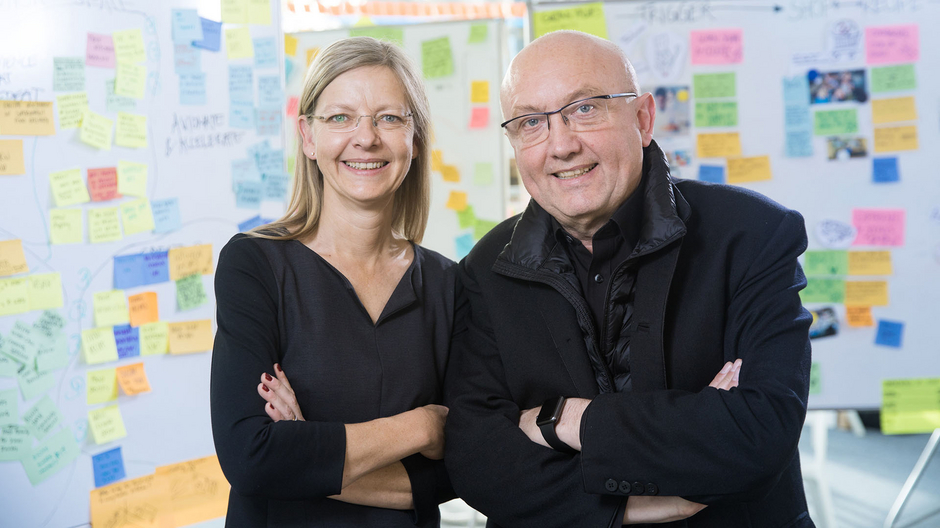#dtimpact22: Design Thinking - The Future
by Uli Weinberg and Claudia Nicolai
Design Thinking and the underlying focus on collaboration, cross-disciplinarity, critical thinking, and creative problem solving is being recognized as necessary and purposeful in more and more areas. What will become of D-School when these Future Skills become dominant in kindergartens, schools, universities, and further education institutions? Will special institutions like the HPI School of Design Thinking no longer be needed in 15 years? Probably so, but even the D-School is changing and moving into new subject areas.
At the beginning of the COVID-19 pandemic in March 2020, the highly agile setting and the permanent willingness to learn, which are not only imparted to the students but also characterize the entire D-School team, made the D-School capable of change extremely quickly. Within a few days, a "remote collaboration protocol" had been jointly created, which was permanently revised and supplemented in the following months. A "virtual collaboration toolset" was put together listing various software packages, and the learning and working environment, which had previously been location-bound, was virtually transferred to the digital space in a short time. A complete redesign of the program structure followed, and by the start of the summer semester in April 2020 everything was ready to get started remotely with over 100 students from 20 countries.
Now it's time to rehash the experiences of the past few years, to merge the creative collaboration in the physical learning space of the D-School with the positive experiences of purely digital collaboration during the Corona crisis. New, hybrid learning and working environments have emerged that enable creative teamwork without the need for everyone to be physically gathered around a table.
The challenge: digitally connected team members must be able to collaborate at eye level with fellow students on site. This requires not only new furniture and room concepts but also new, digital communication and interaction components that must be cleverly combined.
Flexibility, variability, and changeability characterize these "HyFlex" learning environments of the HPI D-School. In line with its self-image as a prototype for the learning environment of the 21st century, the HPI D-School is thus becoming a role model and experimental laboratory for the university landscape and other educational institutions, but also for companies and organizations looking for new, hybrid forms of work.
Another future field is opening up in cooperation with the Institute of Electrical and Electronics Engineers (IEEE), the world's largest association of engineers. For several years now, the standardization department of this world association, IEEE SA, has been developing a new standard for ethically based technology development and has chosen HPI and the Global Design Thinking Alliance as a partner for the worldwide dissemination and establishment of this value-oriented development approach.
P7000 is the name of this set of ethical system requirements to be used in the development of complex systems and software applications and, in particular, applications and systems in the fields of robotics and artificial intelligence. The Design Thinking process, as a consistently holistic and human-centered approach, will play a significant role in the coming years in training engineers and developers in identifying ethical issues. GDTA members will develop training programs around the globe that initiate, enable, guide, and support value-driven design and development processes to minimize ethical risks for organizations, stakeholders, and end users.
Thus, the concept of design moves a step further and Design Thinking gains relevance, not only in organizational issues of large companies in the context of digital transformation but also in ethical issues around future developments in the future-tech sector. It is also about questions of technological self-restraint in the coming decades. A look at the exponential development of computing and storage capacities alone makes it clear that more and more will be technically feasible that is ethically questionable or undesirable. Exploring this and maintaining the balance will be one of the great challenges for the next generations.
With its holistic, complex view of complex issues, Design Thinking will also become an indispensable tool for organizations and companies in questions of sustainable development in the coming years. Not only the Sustainable Development Goals of the United Nations will continue to be the major framework for us in the coming years. Design Thinking as a pattern of thought and action will provide new solution spaces for questions of sustainability, e.g. in cooperation with the Cradle to Cradle movement oriented towards a consistent circular economy.
The political space is also opening up and looking for new ways of participation, co-determination, inclusion, and diversity, especially in democratically oriented societies. It is encouraging that the first state and federal ministries are using Design Thinking and other agile approaches to solve political problems. A new field of activity for Design Thinking will open up here in the coming years - the complex geopolitical problem situations are virtually calling for new ways of solving them.
Design Thinking ImpAct magazine
This article is part of our Design Thinking ImpAct magazine, which we published on the occasion of our 15th anniversary in 2022.
Design Thinking ImpAct Conference: Panel Discussion
At the Design Thinking ImpAct Conference, George Kembel, Maria Yang (MIT), Richard Perez (Hasso Plattner d-school Afrika), Uli Weinberg, and Claudia Nicolai (HPI School of Design Thinking) discussed and shared their visions for the future of Design Thinking: Watch the recording of the discussion. The panel was moderated by Jen Tzen Tan and Christian Smirnow.
The "Design Thinking ImpAct Conference: 15 Years of Design Thinking at HPI" took place in a hybrid format on September 15th and 16th, 2022.

